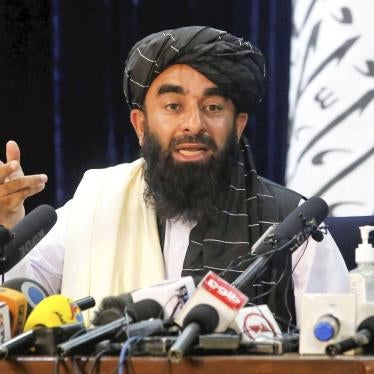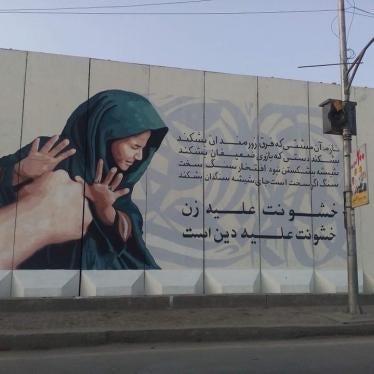Dear Prime Minister,
We write to you to urge your government to take urgent steps to address the human rights crisis in Afghanistan and help protect Afghan civilians at particular risk.
Safe passage and international protection for fleeing Afghans
We understand evacuation plans are underway prioritizing Australians and Afghans who worked with the Australian Defence Force and locally engaged staff. Any evacuation plan should include Afghans who have worked directly or indirectly with the Australian government, or who would otherwise be perceived as being associated with Australia.
We urge you to prioritize providing safe passage and travel documents for Afghans at heightened risk of persecution from the Taliban because of their past work or status, along with their immediate family members, whether inside or outside Afghanistan. Many in need of assistance are not at the Kabul airport, but may have already left the country, or are in the process of doing so, and may require documents and assistance in third countries.
Civilians feared to be at particular risk include those who have worked to promote human rights, democracy, women’s rights, and education; academics, writers, journalists, and other media workers; and people who have worked for foreign countries; among other at-risk categories. Members of ethnic minorities and Shia Muslims, especially Hazaras, are also at greater risk.
We urge you to announce an urgent relocation and resettlement program for Afghans at high risk. This would be in addition to the regular annual humanitarian intake. This should include options whereby at-risk Afghans can apply for humanitarian visas in third countries together with facilitating their evacuation and safe passage from Afghanistan. We would urge you to approve an extra humanitarian intake such as Canada, Germany, the United Kingdom, and United States have done. We also urge you to prioritize family reunion applications for relatives of Afghan Australians who may be at risk.
There are at least 4,200 Afghans on temporary visas in Australia and 53 in detention who doubtlessly are terrified of being sent back to Afghanistan. The Immigration Minister has said “no Afghan visa holder currently in Australia will be asked to return to Afghanistan while the security situation there remains dire.” But the Australian government should immediately place a moratorium on all deportations and forced returns of Afghan nationals. In light of the fact that temporary visas are subject to applications for renewal, we urge you to create a pathway to permanent residency for all those on precarious temporary visas. Citizens of Afghanistan transferred to Papua New Guinea or Nauru should be relocated to Australia and also afforded international protection.
Humanitarian assistance and civil society support
We urge you to increase humanitarian assistance to neighboring countries to which Afghans are fleeing and support those countries admitting them. The Australian government should also pledge new support for nongovernmental groups inside and outside of Afghanistan that assist with refugee resettlement, and otherwise promote humanitarian and human rights needs, including for women, children, internally displaced people, and others, as well as education, health care, and other vital needs. The participation of Afghan civil society groups in discussions of assistance and resettlement is vital.
The United Nations: strengthening reporting and fact-finding
We urge you to support a Special Session of the UN Human Rights Council in Geneva to create an international mechanism to collect and preserve evidence of violations and abuses by all parties to the conflict in Afghanistan and prepare files to facilitate fair and independent criminal proceedings, with the assistance of the UN High Commissioner for Human Rights.
We ask you to call on the UN Security Council to immediately adopt a resolution demanding that all parties to the conflict in Afghanistan abide by international human rights standards and international humanitarian law, notably the humane treatment of civilians and combatants in custody. It should reiterate that the International Criminal Court, to which Afghanistan is a party, can prosecute war crimes and crimes against humanity. The resolution should call on the new authorities to ensure that everyone, including internally displaced people, have full and free access without discrimination to humanitarian assistance from UN agencies and humanitarian groups.
The Security Council is set to renew the mandate of the UN Assistance Mission in Afghanistan (UNAMA) in September. UNAMA’s mandate should be expanded to explicitly include collecting information and evidence of serious violations and abuses. The council should instruct UNAMA to publicly report on its findings and share information and evidence with the Office of the Prosecutor of the International Criminal Court as well as other international or domestic bodies investigating war crimes and other abuses in Afghanistan.
We would be happy to discuss these issues with you and your team.
Sincerely,
Elaine Pearson
Australia Director
Human Rights Watch
CC:
Senator Marise Payne, Minister for Foreign Affairs
Karen Andrews MP, Minister for Home Affairs
Alex Hawke MP, Minister for Immigration, Citizenship, Migrant Services and Multicultural Affairs
Peter Dutton MP, Minister for Defence








